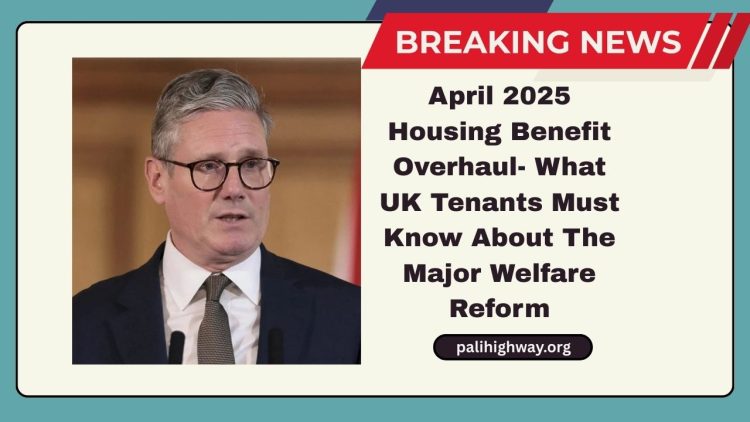As April 2025 approaches, the UK government is rolling out a significant overhaul of the Housing Benefit system, marking one of the most comprehensive reforms in recent years.
Designed to address growing economic pressures, rising housing costs, and the need for responsible public spending, the changes aim to improve efficiency while targeting support to those most in need.
This reform will not only affect the amount and method of benefit distribution, but it will also tighten eligibility criteria and introduce new employment conditions for working-age applicants.
Both new and existing claimants must brace for an updated system that demands increased accountability and adaptability.
Key Drivers Behind the Housing Benefit Reform
The overhaul comes in response to ongoing economic challenges, including:
- High inflation rates
- Soaring private rental prices
- Slow wage growth
- Mounting pressure on public welfare budgets
The government seeks to introduce a needs-based model that aligns financial aid with real-time economic and regional market conditions, promoting self-sufficiency among working-age individuals.
Tightened Eligibility Criteria: Are You Still Qualified?
From April 2025, stricter income and asset thresholds will be enforced. Here are the key updates:
- Claimants with moderate savings or part-time secondary income may be disqualified.
- Existing recipients must undergo reassessment to retain their eligibility.
- Universal Credit claimants may experience recalculated entitlements, possibly leading to a reduction in total benefits.
This change is expected to affect:
- Individuals with variable income streams
- Households recently transitioning into employment
- Families receiving multiple benefits
Important: All current and future applicants should consult official calculators or local housing offices to evaluate their revised eligibility.
Stronger Work Participation Rules for Working-Age Claimants
Non-pensioner recipients will now be required to:
- Show active job-seeking behavior
- Engage with employment training or advisory programs
- Possibly increase working hours or shift to full-time work
Exemptions:
- Pensioners
- Certified disabled individuals
- Full-time caregivers
This change aims to boost long-term independence, but critics fear it may penalize part-time workers or those in precarious job markets.
Regional Payment Adjustments: Location-Based Calculations
A revamped payment structure will introduce region-specific benefits:
| Region Type | Expected Change in Payment | Key Considerations |
|---|---|---|
| High-Rent Areas | Modest increases | To reflect escalating private rental prices |
| Low-Rent Areas | Capped or reduced payments | Designed to manage public spending efficiently |
| Social Housing | Minor adjustments likely | Based on regulated rent frameworks |
This approach is intended to align support more closely with real-time rental markets, especially in high-demand urban regions.
Impact on Tenants and Landlords
Private Tenants:
- May face a gap between rent and benefit payments
- Could be forced to supplement rent from other sources
Social Housing Tenants:
- Likely to see slight adjustments in entitlements
- Still benefit from stable rent regimes
Landlords:
- Must adapt rent collection strategies
- Should coordinate with tenants to manage payment timelines
Preparing for the Transition: Steps to Take Now
To prevent disruptions and prepare for reassessments, claimants should:
- Monitor government updates on official platforms
- Schedule appointments with housing or welfare support officers
- Use online eligibility calculators to simulate benefit changes
- Stay alert for reassessment notices and documentation requirements
The government is expected to roll out awareness campaigns in March 2025, featuring webinars, local seminars, and step-by-step guides to ensure a smooth transition.
Long-Term Implications of the Housing Benefit Reform
This reform is more than just a policy shift—it signals a broader transformation in the UK’s approach to social welfare. Key considerations include:
- Increased pressure on borderline-income households
- Higher administrative workload for support services
- Emphasis on personal financial responsibility and employment growth
Adaptability is key—claimants should consider:
- Relocating to more affordable areas
- Applying for discretionary housing payments
- Enhancing income through flexible or part-time work
The April 2025 Housing Benefit reform is poised to redefine financial assistance for renters across the UK. With regional payment adjustments, tighter eligibility, and new work expectations, claimants must stay proactive and informed.
Whether you’re a tenant, landlord, or welfare advisor, navigating this transition successfully will require planning, adaptability, and close attention to government guidance.
FAQs
Will current Housing Benefit recipients automatically continue receiving support after April 2025?
No, many recipients will undergo eligibility reassessments under the new criteria and may need to provide updated documentation.
Are pensioners affected by the new work participation rules?
No, pensioners are exempt from the work requirements. These rules apply only to working-age non-pensioners.
How can claimants prepare for the benefit changes in April 2025?
They should use online tools, consult housing officers, and stay informed through official announcements and benefit calculators.
